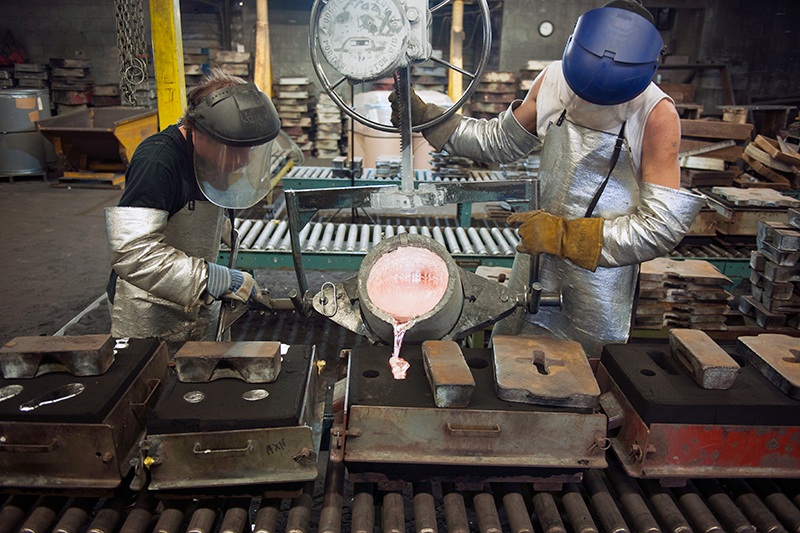How to Explain the Foundry Process | Step-by-Step Guide

How to Explain the Foundry Process?
When people ask What is the foundry process , they are usually trying to find out how metal structures and parts of everyday life are manufactured. The foundry process is used to build everything from machine parts and pipes to tools. This guide explains what the Foundry Process is and how it works. It also explains why it's important for industries that rely on well-made, strong metal parts.
What is the Foundry Process in simple terms?
What is the foundry process? It's a method for making metal parts that involves melting metal, pouring it into a mould, and then cooling it. As the metal cools down and hardens, it takes on a solid form that is identical to the original mould. It allows workshops and factories to produce large quantities of parts that are identical and have precise and strong shapes.
The foundry process is used by companies because it's cost-effective, efficient, and reliable. The foundry process can produce everything from tiny bolts and nuts to huge engine blocks or machine frames.
What is the importance of the Foundry Process for Business?
You can see why foundry processes are essential to businesses now that you understand. Metal castings are used by industries like automotive, construction machinery, energy, and more. Machines would break down faster, and projects could be delayed or cost more if they didn't have well-made parts.
Find out why the Foundry Process is valuable to businesses.
-
Custom Design: Foundry processes allow companies to produce custom parts of many shapes.
-
Hardness: Metal casts can withstand heavy loads and high stresses.
-
Repeatability: A mould can be used many times for identical parts.
-
Cost savings: Casting in large quantities at one time keeps production costs in check.
The Foundry Process: Key Steps
It is helpful to examine the steps in order to understand better. This is a quick breakdown of the process:
1. Pattern Making
It all starts with a template. A pattern serves as the template for creating a part during the casting process. It's usually made of wood, metal, or plastic. The pattern is important because it determines the size and form of the final casting.
2. Mould Making
Workers create a mould once the pattern has been made. Moulds are empty cavities where liquid metal is poured to form a solid part. Sand is a popular material for moulds, as it is easy to work with and can withstand heat.
3. Melting
The metal is heated to high temperatures in a furnace to melt it. The choice of material varies based on the casting's intended use, with common options including iron, steel, aluminum, and bronze.
4. Pouring
The metal is poured carefully into the mould when it reaches the correct temperature. During this stage, workers must take safety precautions because the metal is very hot and can be dangerous to handle.
5. Cooling and solidification
The metal must cool down and harden in the mould after it is poured. It is important to manage the cooling process properly in order to prevent cracks and weaknesses.
6. Remove the Casting
After the metal cools, the part is extracted from the mould. Any excess material is trimmed off, and the part is cleaned to eliminate sand and remaining mould material.
7. Finishing
Finishing is the final step. The final step is finishing. This can include machining, coating, polishing, or finishing to achieve the desired size, appearance, or strength. The casting can be used for industrial machinery and building projects after finishing.
There are many types of foundry processes.
There are many types of foundry processes. Some of the most common types are:
-
Sand casting: This is the most traditional and widely used method, ideal for casting large parts with sand moulds.
-
Investment casting: Also known as lost-wax cast, this method is suitable for small, detailed parts.
-
Metal moulds are used in Die casting, where high pressure is applied to shape the material.
-
Shell casting: An improved version of sand casting that utilizes a hardened shell to improve surface finish and detail.
Each type is used differently depending on the size, details, and materials needed.
What Businesses Do with the Foundry Process
Many industries rely on foundry processes for their daily operations. Here are some examples:
-
Automotive Industry Engine Blocks, Brake Parts, and Transmission Housings
-
Construction: Structural Beams, Columns, and Brackets
-
Agriculture: Casting parts for tractors, farming equipment, and other agricultural machinery.
-
Energy: Parts and components for oil rigs, turbines, and generators.
Strong cast parts are essential for any business, no matter what industry. They keep machines working and projects on track.
What to look for in a Foundry partner
What is the foundry process? It is only the beginning. Finding reliable iron foundries in usa for businesses is as important as choosing the proper method. A trusted foundry can help companies produce high-quality castings within budget and on time.
Here are some things to watch out for:
-
Experience: A foundry that has years of experience can handle complicated projects.
-
Quality Control: Good Foundries test their castings at every step.
-
Custom Work: They must offer custom mould design, finishing, and other services.
-
Customer Service: Good Communication from Planning to Delivery
AKP Ferocast has been a name that businesses have trusted for years to provide high-quality castings with reliable service.
Other Terms You Should Know
When learning what is a foundry process , you will also encounter terms such as "metal casting", "pattern making", "moulding", or "casting procedure". These all refer to the same idea: shaping molten material into parts that businesses can use.
Final Thoughts
Understanding the foundry process can help businesses make better decisions when it comes time to source strong and reliable components. The foundry process is a great way to create parts for your specific needs, whether you are managing a small industrial project or a workshop.
Businesses can reduce costs and save time by working with experts who know the process, choose the right metals, and work on projects in a timely manner.
The next time you see an engine block or a machine part that's strong and durable, you will know the importance of the foundry.





